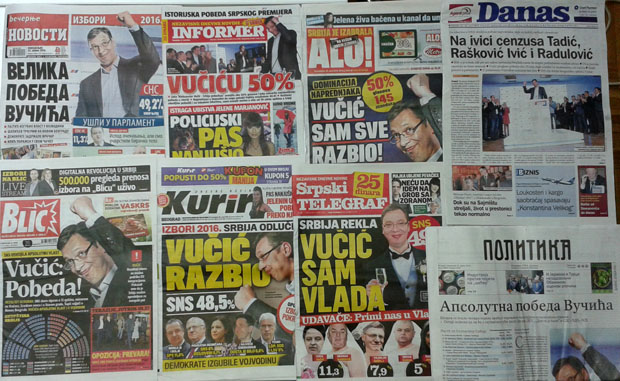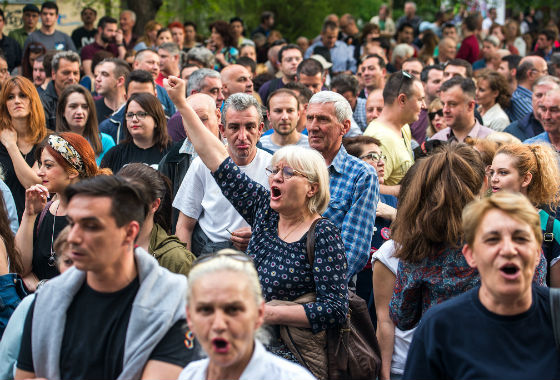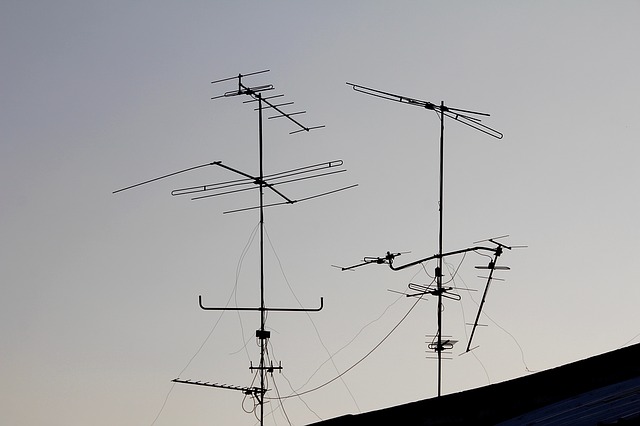Political Pressures, Economic Insecurity Biggest Threats to Media Freedom in Balkans

Political Pressures, Economic Insecurity Biggest Threats to Media Freedom in Balkans
Fear of loosing jobs, politics, and self-censorship are suffocating media freedoms - those are the most common thoughts of dozens of prominent journalists from the region - in a survey by Media.ba on the occasion of May 3, the World Press Freedom Day.
Political dictate of strongmen, endangered security, threats, limited and poor market – all these represent the reality of journalism in Bosnia and Herzegovina and other Balkan countries. At the same time, those are the reasons that brought self-censorship to be something often seen as normal, with journalists having low wages, in media companies for which they do not even know who are the owners, how are they being financed and in whose interests are they working, dozens of journalists and media experts from Bosnia and Herzegovina, Serbia, Croatia, Montenegro, Kosovo, Macedonia, Albania and Turkey, noted – almost without a difference.
Dunja Mijatović, OSCE Representative on Freedom of the Media, said that the lack of access to information is the biggest threat to media freedom.
„Without access to information, members of the media are not able to seek and receive information on issues of importance to the public. Without it, governments cannot be held accountable for their actions and open to public scrutiny. Attempts are being made to block, filter and close down websites to suppress media freedom on the Internet, hampering everyone’s right to access to information. This right has to be safeguarded,“ she told Media.ba.
One of those who experienced pressures on her own skin, editor of the Mostar-based portal Tacno.net, Štefica Galić, said that media which offer fair and professional information are rare.
„[Media] are often services of political power, dealers of hatred, accomplices of rehabilitation of dark ideologies, servants of the government, and not their critics. They are of non-transparent owners. Censorship and self-censorship is implied. Freedom of journalists is a dream,” said Galić, “Attacks on journalists are not sanctioned, nor is hate speech. Police and judiciary are often serving the politics. I am speaking from my own experience. A democratic state should support independent media and journalists. And here - there is no state nor democracy. Only those who serve the system, not the truth, are being supported.”
Dependent judiciary and bad laws lead to journalists and media not being in a situation to defend themselves against political and business elites, said director of Center for Investigative Journalism of Serbia, Branko Čečen, and added that there are also problems in economic sense and in lack of knowledge of, especially young, journalists.
“Media and journalists are victims of the system in which the professional knowledge and skills are not needed since that is not necessary for the obedient shallowness. In poor societies there is no democracy, it is an expensive ‘play-toy’ and poor media are without a defense before the sources of pressure,” said Čečen and argued that the freedom of media is obstructed also by the lack of culture of public interest in the society but that media “accepted easily” the culture of rule of power and “joined the sources of money (private and state) and now they are paying that expensively.”

“Media and journalists are victims of the system in which the professional knowledge and skills are not needed since that is not necessary for the obedient shallowness." Foto: Cenzolovka
Self-censorship Has ‘Eaten’ Almost Everything
Heni Erceg, contributor of Mladina from Split, told Media.ba that the freedom of media is nowadays dictated by media owners, mostly suspicious individuals who need the media to serve the government and their other basic businesses.
“So they dictate the opportunistic editorial policy and induce the worst – self-censorship among journalists, and with the arrival of new revolutionary government which decided to make a state, and with it the media, since the very beginning, there is almost no independent media,” she argued, “Media freedom is additionally obstructed by the judiciary because every fascist punk who sues you can take it in advance that they will have a positive result and a significant amount of your personal money, which is a great basis for self-censorship. A little bit of satire in the media which existed, already suffered, because laughter is the biggest enemy of every totalitarianism.”
Aleksandar Trifunović, editor of the Banja Luka-based portal Buka.com, said that one must fight for the freedom of expression personally, and the same goes for journalism.
“The main obstacle to media freedom are journalists who take self-censorship as an excuse for inaction. If all journalists did their work fairly, it would be different. Most journalists are ready to be self-censored,” he said.
The dictate of the owners is affecting the work of journalists in Montenegro too, said Vladan Mićunović of the Podgorica-based Institute for Media, and clientelism brought to the situation that most media “capitulated” before carriers of political and economic power and they are imitating the essence of freedom of expression.
“Those media who keep up with those values and who try to open a discussion about sensitive issues, have critical stands or ask unpleasant questions to the ruling elite, survive harder and harder,” he argued, “They are exposed to various pressures – from physical violence to the ‘quite censorship’ which manifests through non-transparent pumping of money in amounts worth millions to friendly, suppressed media.”
When it is about the media which question the ruling political elites, Jeta Xharra, director of BIRN Kosovo, stands that the financing of investigative journalism can be hard “when you have a bully government” but that does not mean that one has to give up nor that the freedom of expression must not be sacrificed in the name of short-term or mid-term political goals.
Remzi Lani, executive director of the Albanian Media Institute, said that the media in that country continued to be, in a way, an extension of politics, and, on the other, an annex of different businesses.
“The media continues to serve politics and business, but not the public. Public service values in Albanian media are seriously threatened. This is a serious problem and a challenge. Media clientelism now has become the norm.”
One of the countries where the journalists are especially endangered and where dozens are jailed, Turkey, is a dangerous place for journalism, said Nurdan Sahin from P24, a platform for independent journalism in Turkey.
“We have in general, worldwide, a bit of movement towards autocracy. Media ownership is a big problem. Good journalism is also a problem because good journalism, especially investigative journalism, still has its clients and I believe journalists can save journalism,” she noted.
For Almir Panjeta, a journalist from Sarajevo, the biggest threat to freedom of expression in Bosnia and Herzegovina is that there is “not enough freedom, nor enough expression”.
„People more and more withhold themselves from expressing about anything, from having and showing an opinion on certain topics, all based on a fear of public misunderstanding and public condemnation, no matter how trivial,” Panjeta said, “Self-censorship has eaten ‘almost’ all free-minded authors, everyone’s reporting in a way that no one is offended, or that they are as little as possible offended, so that there is less and less threat and more and more limitation of freedom of expression in Bosnia and Herzegovina.”

Protesti u Makedoniji: "Kontrola vlade nad medijima glavna prepreka medijskim slobodama", kaže novinarka Meri Jordanovska / Foto: Vanco Dzambaski
Pressures and Lack of Knowledge
Media are under multiple pressure: from a corrupted political system, economy, insufficiently developed democracy in the society, but also – from themselves, said Agron Bajrami, editor-in-chief of Koha Ditore from Kosovo.
“In Kosovo there is more and more media every day, specially online, to whom the standards of profession are unimportant, to whom the journalism ethics are unknown (or not important), which openly work as servants of some parties, or formal and informal groups of political-economic interests. If I would have to choose which one of these is the largest danger, I think I would say lack of professionalism and lack of ethics, because the media always faced pressures by the government, politicians and powerful people, as well as lack of money and social pressure and intolerance. We survived because of professionalism and ethics,” he said, “If we loose that, nothing can save us.”
Meri Jordanovska, journalist of the Macedonian portal Prizma.mk, said that the government’s control over the media is the main obstacle to media freedom and that this is done through financing from budgets for governmental commercials and different projects.
“The other way of control is making direct or indirect pressures on the media owners and editors, in order to change the editorial policy in favor of the Government. That way, it is not hard to conclude that the Government and the ruling party are the main financiers of the mainstream media in Macedonia, and they totally depend on those money. That way, they are obligated to report in the favor of the ruling party. Even if they reject, the Government has every institution under its power, including the courts, so it's very easy to press the owner of the media or the editor by sending inspections or crime convictions,” Jordanovska noted.
Financial hardship and a fear of loosing a job are the biggest problems to media freedom, said Dejan Anastasijević, journalist in the magazine Vreme in Serbia.
“Lately, not just here but globally, journalism is no longer a paid profession, and I am afraid that in the upcoming years there will be as many journalists who live of journalism as there are poets living of poetry,” Anastasijevic stands, “All other problems stem from there, because it is easy to misuse or blackmail a poor and a frightened man. Unfortunately, I do not expect that things will get better soon.”
Boris Pavelić, journalist with Novi list from Zagreb, described the pressures of the authorities as creating societies where journalism is replaced with media chauvinist anti-minority propaganda.
“They achieve that with a combination of state measures, through legal limitation of space for free expression, by ideologization of public and deals with private media, but also by open violence against journalists and writers. Globally, media are in a long term more and more endangered by more dangerous fanatic and fundamentalist movements of various sorts, even in the free West,” he said.
Zerina Ćosić, journalist of Television of Federation of Bosnia and Herzegovina, told Media.ba that due to political influence on the work of journalists, through corruption or giving selected information, serious investigative stories cannot be done.
“Another threat to freedom of media and freedom of expression is simply that journalists are not capable, enough educated or they are conditioned to select sources and information, by managers or editors, when working on stories important for the public,” Ćosić concluded.
Lutfi Dervishi, analyst and media expert from Albania, said that journalists are not free because owners of the media are not free and that in stead of the role of a watchdog, media are obedient.
“More and more we are seeing reports without reporters where story happens,” he said, “The last election campaign in Albania was reported without reporters. Parties send cooked cookies to the media.”
Rubina Čengić, journalist in Magazine Start BiH, said that the biggest threat to freedom of expression in the media are material and economic insecurity, political pressures of various forms and ignorance of the public for what the media is reporting about.
“Due to economic or financial (material) insecurity both owners of the media and journalists individually can start accepting compromises in order to survive, and there is nothing worse for freedom of expression than exactly those compromises,” she noted, “Actually, I think that freedom of expression and freedom of profession stops where compromises start. Political pressures of all forms also threaten freedom of expression because you either don’t have an information or you are afraid.”

Failure to Implement Laws
Impunity of attacks on journalists and political pressures of journalists are problems that Borka Rudić of Association of BiH Journalists emphasized.
“If in a country such as Bosnia and Herzegovina only 15 percent of cases is processed through judicial system, then we are sending a message that attacks on journalists are a socially desirable behavior and that those who attack journalists will not take any consequences,” Rudić said.
President of the Croatian Journalists' Association, Saša Leković, stands that the main obstacle to freedom of media and expression are always firstly politicians who do not work in the public interest because they adopt bad laws and allow unsanctioned non-implementation of good laws.
“They allow corruptive processes in which the owners of commercial media participate, they see public media as ‘war loot’ after the elections and they misuse them for their political goals,” Leković said.
Asked about obstacles to media freedom, Draško Đuranović, editor-in-chief of the Podgorica daily Pobjeda, said that “media freedom is not given as a gift and that it is not a grant by the international community, that investigative journalism is not searching Google and that the freedom of expression does not mean freedom of unpunished accusation.”
Blackmails and Financial Dependence
Media expert from Montenegro, Duško Vuković, said that the media and journalists are turning to capitalist way of looking at the profession where the freedom of media is lost, but that the citizens are the same.
“Citizens should be the most interested in freedom of media which as a result has the most qualitative communication in a society and working in the name of public good and interests. The problem is that the citizens, in the context of capitalist way of production, are seen firstly as consumers of the media,” he said, “Until media, and media companies, are functioning just as any other capitalist company, media freedom will have their main obstacle right over there.”
Editor of the online magazine Žurnal.info, Eldin Karić, said that the biggest threat to freedom of expression and media is money.
“The money under control of the government and the institutions of the system. In Bosnia and Herzegovina 30 million KM is spent annually in the media, through different levels of government, and not one fening came to independent media but those are spent with political purpose,” he said.
Gordana Igrić, regional BIRN director added that the lack of business model for the media and a developed market is the main obstacle to media freedom which “brings to political conditioning and blackmails by the authorities and advertising companies”.
Jeton Musliu, journalist of Radio-television of Kosovo told Media.ba that the finances became the main problem.
“Media in the Balkans, especially in Kosovo, simply struggle to survive more than to investigate anything,” Musliu said.
Nadežda Gaće, editor-in-chief of Novi magazin from Serbia, said that journalism in that country is burdened with sensationalism, scandals, powerful commitment to only one side.
„There is no dialogue, nor pluralism of opinions, monologues dominate the scene. By reading the newspaper and watching TV, I think that I don’t live in Serbia, because there is no information, analysis, objectivity of the profession,” she concluded.




